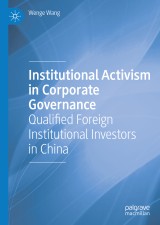Details

Institutional Activism in Corporate Governance
Qualified Foreign Institutional Investors in China|
CHF 83.00 |
|
| Verlag: | Palgrave Macmillan |
| Format: | |
| Veröffentl.: | 22.11.2019 |
| ISBN/EAN: | 9783030195779 |
| Sprache: | englisch |
Dieses eBook enthält ein Wasserzeichen.
Beschreibungen
<div>Using both qualitative and quantitative methods, this book examines whether qualified foreign institutional investors (QFIIs), through their shareholder activism, have a meaningful positive impact on the corporate governance of firms listed on the mainland Chinese stock market. Capital flows into and out of China are still subject to tight controls, and the QFII scheme is one important avenue through which QFIIs can become invested in the Chinese stock market.<br> <br> This book is an invaluable resource for anyone interested in learning about ways to invest in one of the world’s largest economies. Wang discusses in depth what specific opportunities, challenges and restrictions to expect in the process, and how investing in China differs from investing in countries with a more open capital account.<br> <br><br> </div>
Part I: Introduction.- Chapter 1: Description of the Research.- Part II: Capital Globalization and Institutional Activism: Foreign Institutional Investors in Emerging Economies.- Chapter 2: Institutional Investment and Integration of Global Capital System.- Chapter 3: QFIIs’ Institutional Activism in Emerging Economies.- Part III: The Mechanisms of Institutional Activism: The West and China Compared.- Chapter 4: The Mechanisms of Institutional Activism in the US and Europe.-Chapter 5: The Mechanism of QFIIs’ Institutional Activism in China.- Part IV: The Capacity and Motivation for Institutional Activism: QFIIs in China.- Chapter 6: QFIIs’ Capacity for Institutional Activism.- Chapter 7: The Motivation for QFIIs’ Institutional Activism.- Part V: Institutional Activism and Firm Performance: QFIIs in China.- Chapter 8: Background, Data and Analytic Strategy.- Chapter 9: Hypothesis Test, Analysis and Discussion.- Part VI: Conclusion.- Chapter 10: Overview and Way Forward.<p></p><p></p>
Wenge Wang is EU Marie Curie Global Fellow at the University of Sheffield, UK. Before coming to Sheffield, he was a professional of versatility with experiences in business, legal practice and other sectors for more than 20 years in China.
Using both qualitative and quantitative methods, this book examines whether qualified foreign institutional investors (QFIIs), through their shareholder activism, have a meaningful positive impact on the corporate governance of firms listed on the mainland Chinese stock market. Capital flows into and out of China are still subject to tight controls, and the QFII scheme is one important avenue through which QFIIs can become invested in the Chinese stock market.<br><br>This book is an invaluable resource for anyone interested in learning about ways to invest in one of the world’s largest economies. Wang discusses in depth what specific opportunities, challenges and restrictions to expect in the process, and how investing in China differs from investing in countries with a more open capital account.<br>
Reviews capital globalization and institutional activism in emerging economies Explores QFIIs’ role in the corporate governance of Chinese listed companies Analyses the capacity and motivation behind QFIIs’ investment in Chinese equities and the connection between their investment strategies and their behaviour as shareholders Investigates the correlation between the extent of QFIIs’ shareholdings and the performance of Chinese listed companies
Diese Produkte könnten Sie auch interessieren:

Die globale Finanzkrise. Löste der folgende Kreditabschwung eine Deglobalisierung aus?

von: Constanze Krasselt

CHF 19.00















